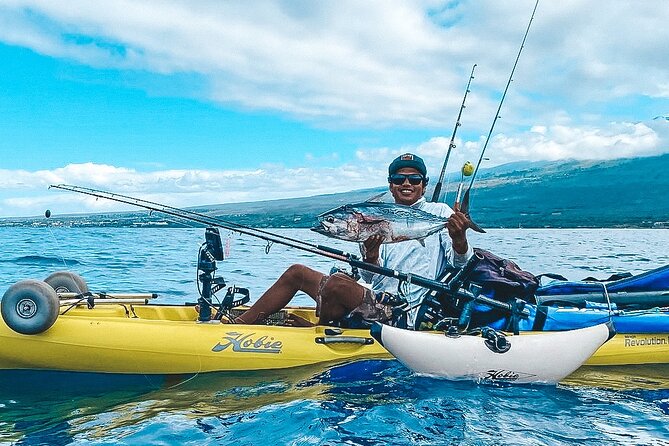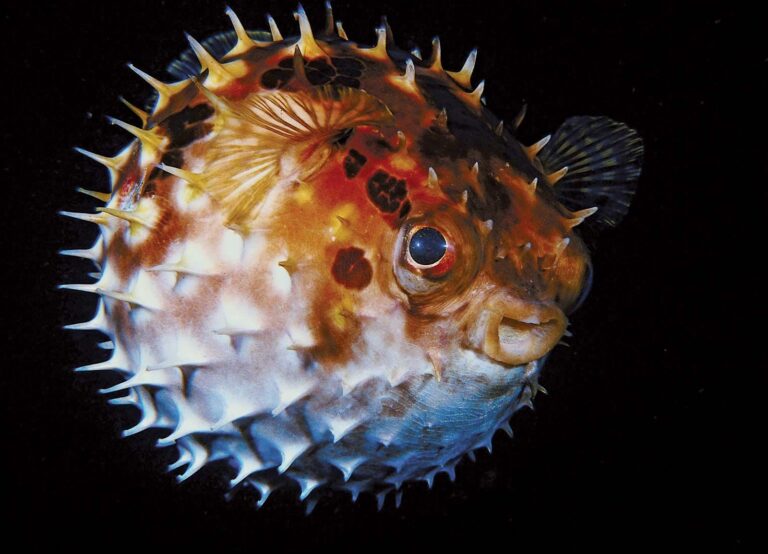Deep sea fishing can cause motion sickness due to the constant movement of the boat and the potential for rough waters. However, there are preventative measures that can be taken to minimize the chances of feeling sick.
These include taking anti-motion sickness medication, choosing a larger and more stable boat, and staying hydrated. Additionally, eating a light and non-greasy meal before heading out to sea can also help reduce the risk of motion sickness. By taking these precautions, deep sea fishing can be an enjoyable and nausea-free experience.

Credit: www.amazon.com
Understanding The Factors Behind Nausea In Deep Sea Fishing
Deep sea fishing is an exhilarating activity that allows you to explore the vast ocean depths and reel in some incredible catches. However, for some individuals, the excitement can be dampened by the unpleasant sensation of nausea. If you’re wondering if deep sea fishing will make you sick, it’s important to understand the factors behind this queasy feeling and how they connect to the sport.
Motion Sickness And Its Connection To Deep Sea Fishing
Motion sickness, also known as seasickness, is a common challenge faced by many deep sea anglers. This condition occurs when there is a disconnect between the sensory inputs your body receives, leading to feelings of nausea, dizziness, and fatigue. Here are a few key points to keep in mind about motion sickness and its link to deep sea fishing:
- The motion of the boat on the water triggers the inner ear, which helps maintain balance in the body. When the brain receives conflicting information about movement, such as feeling the rocking of the boat but seeing a stationary environment, it can result in motion sickness.
- The constant swaying and rolling of the boat can disrupt the body’s equilibrium and lead to an unsettled stomach. The repetitive and unpredictable movements can considerably increase the likelihood of experiencing seasickness.
- It’s important to note that individuals who are prone to motion sickness in other situations, such as car or air travel, are more likely to experience it while deep sea fishing as well. Understanding whether you are susceptible to motion sickness can help you take precautionary measures before heading out on your fishing adventure.
The Role Of The Inner Ear In Inducing Nausea
The inner ear plays a critical role in maintaining our sense of balance and stability. It contains tiny fluid-filled canals called the semicircular canals, which are responsible for detecting rotational movements. Here’s what you need to know about the inner ear’s involvement in inducing nausea during deep sea fishing:
- When the boat rocks side to side or pitch up and down in the water, the fluid in the semicircular canals moves accordingly. This prompts signals to be sent to the brain, which may conflict with the visual cues received.
- The mismatch between the inner ear’s sensory information and what the eyes perceive can send mixed signals and confuse the brain. This sensory dissonance often leads to the uncomfortable symptoms associated with motion sickness, including nausea.
- Although the inner ear’s function is crucial for maintaining balance, the same mechanism can contribute to feeling sick when the body is exposed to prolonged motion, such as on a fishing boat.
How The Body’S Balance System Reacts To The Boat’S Movements
The body’s balance system is a complex network that relies on input from various components, including the inner ear, eyes, and proprioceptors (sensors in the muscles and joints). Here are some key points explaining how the body’s balance system reacts to the boat’s movements during deep sea fishing:
- As the boat moves through the water, the inner ear detects the shifts in balance and relays this information to the brain. This helps the brain make constant adjustments to maintain equilibrium.
- The proprioceptors in the muscles and joints provide additional feedback to the brain about body position and changes in movement. Together with the inner ear’s input, this helps the body respond appropriately to the boat’s motions.
- The body’s reaction to the boat’s movements can vary from person to person. Some individuals have a stronger ability to adapt and maintain balance, while others may struggle more, resulting in feelings of nausea.
The Impact Of Visual Cues On Nausea During Deep Sea Fishing
Visual cues play a significant role in our sense of balance and orientation. When deep sea fishing, these cues can have a considerable impact on the sensation of nausea. Here’s what to consider regarding the influence of visual cues:
- When you’re on a boat, your visual environment may not align with the movement your body experiences. For example, if the boat rocks or pitches, you may perceive the horizon as tilted or unstable, even if the boat’s actual movement is relatively mild.
- Conflicting visual cues can cause sensory confusion and contribute to the development of motion sickness symptoms. The brain relies on consistent information from the eyes and the other balance-related systems, so when these inputs don’t match, it can lead to feelings of nausea.
- Focusing on a stationary object, such as the horizon or a distant fixed point, can help reduce the conflicting visual cues and provide a more stable reference point for your body’s balance system.
Understanding the factors that contribute to nausea during deep sea fishing can help you prepare and take necessary precautions to enjoy your fishing experience without feeling sick. From considering your susceptibility to motion sickness to finding ways to minimize conflicting sensory inputs, being aware of these factors can make a significant difference in your overall enjoyment of the sport.
So, grab your fishing gear, brace yourself for the open waters, and get ready for a thrilling adventure!
Tips To Prevent Nausea When Deep Sea Fishing
Choosing The Right Spot On The Boat To Minimize Motion Sickness
Finding the optimal spot on the boat can make a world of difference when it comes to preventing motion sickness during deep sea fishing trips. Here are some tips to help you choose the right spot:
- Stay near the center of the boat: This is where the least amount of movement is felt, as it is closer to the boat’s pivot point.
- Face forward: Position yourself in a way that allows you to face forward, as it helps your brain synchronize your visual and inner ear cues, reducing the likelihood of nausea.
- Avoid enclosed spaces: If possible, choose a spot that is open and allows for fresh air, as being in confined spaces can exacerbate motion sickness.
The Effectiveness Of Over-The-Counter Medications For Preventing Nausea
Over-the-counter medications can be a convenient option for preventing nausea during deep sea fishing. Here are a few key points to consider:
- Antihistamines: Commonly used antihistamines, such as dimenhydrinate and meclizine, are effective in reducing motion sickness symptoms. They work by blocking signals to the brain that trigger nausea.
- Timing is crucial: Take the medication at least an hour before heading out to sea, as it needs some time to kick in and provide the desired effect.
- Follow the recommended dosage: It’s important to adhere to the recommended dosage provided by the medication’s packaging or consult a healthcare professional for guidance.
Natural Remedies And Alternative Methods To Alleviate Symptoms
If you prefer a more natural approach to preventing or alleviating motion sickness symptoms, there are several remedies and alternative methods to consider:
- Ginger: Ginger has long been used for its anti-nausea properties. You can opt for ginger supplements, ginger candies, or ginger ale to help calm your stomach.
- Acupressure bands: These wristbands work by applying pressure to specific acupressure points on the wrist. They are believed to help ease nausea and are readily available in most drugstores.
- Deep breathing and distraction techniques: Engaging in deep breathing exercises and distracting yourself by focusing on a distant object or engaging in conversation can help take your mind off the symptoms of motion sickness.
How To Prepare Your Body Physically And Mentally Before Going Deep Sea Fishing
Preparing your body physically and mentally before embarking on a deep sea fishing excursion can help reduce the chances of experiencing motion sickness. Consider the following tips:
- Get a good night’s sleep: Being well-rested can contribute to overall well-being and reduce the likelihood of feeling nauseous.
- Eat a light meal: Avoid consuming heavy, greasy, or spicy foods before the trip, as they can trigger or worsen nausea.
- Hydrate properly: Staying hydrated helps maintain a healthy balance in the body and can help alleviate feelings of queasiness.
- Maintain a positive mindset: Adopting a positive attitude and focusing on enjoying the experience can help alleviate anxiety, which can contribute to motion sickness.
Remember, everyone’s susceptibility to motion sickness varies, so it may take some trial and error to find the methods that work best for you. By following these tips, you can increase your chances of having an enjoyable deep sea fishing experience without the unwanted effects of motion sickness.
Exploring The Truth: Personal Experiences With Nausea In Deep Sea Fishing
Anecdotes From Individuals Who Have Experienced Nausea While Deep Sea Fishing
- One angler, sarah, recounted her experience of feeling queasy during her first deep sea fishing trip. She initially felt excited but soon started feeling nauseous once the boat began rocking on the waves.
- Another fisherman, mark, shared his struggle with sea sickness during a deep sea fishing excursion. The constant motion of the boat and the smell of fish bait intensified his symptoms and made him feel unwell.
Strategies They Employed To Overcome Or Manage Their Symptoms
- Sarah tried various remedies to combat her seasickness. She found that wearing acupressure wristbands and taking over-the-counter motion sickness medication provided some relief. She also focused on keeping her eyes on the horizon and taking slow, deep breaths to alleviate her symptoms.
- Mark discovered that drinking ginger tea before the trip helped settle his stomach. He also learned the technique of controlled breathing, concentrating on inhaling deeply through his nose and exhaling slowly through his mouth. This method helped him manage his nausea and enjoy the fishing experience.
The Role Of Distraction And Positive Thinking In Reducing Nausea
- Both sarah and mark found that distraction played a significant role in alleviating their nausea. Engaging in conversation with fellow anglers or listening to upbeat music helped take their minds off their discomfort and reduce feelings of queasiness.
- Positive thinking also proved beneficial in reducing nausea. Sarah practiced positive self-talk, reminding herself that the discomfort was temporary and focusing on the excitement of reeling in a big catch. Mark adopted a similar mindset, maintaining a positive attitude that allowed him to overcome his seasickness and fully enjoy the adventure.
The Importance Of Taking Breaks And Listening To Your Body During The Excursion
- Sarah emphasized the significance of taking breaks during the deep sea fishing trip. She advised fellow anglers to step away from intense fishing activities and find a quiet spot on the boat to rest when feeling overwhelmed by nausea.
- Mark highlighted the importance of listening to your body and acknowledging its limitations. He advised taking short breaks to relax and gather energy. Recognizing the need to pace oneself and rest when necessary can prevent nausea from intensifying and spoiling the overall experience.
Remember, each person’s experience with seasickness may differ, and it’s essential to find what strategies work best for you. By implementing these techniques and being mindful of your body’s signals, you can increase your chances of having a pleasant deep sea fishing adventure without succumbing to nausea.
Conclusion
While there are potential risks associated with deep sea fishing, proper precautions can minimize the chances of getting sick. By choosing a reputable charter company, following safety guidelines, and being aware of your own health conditions, you can enjoy this thrilling adventure without worrying about falling ill.
It’s important to be mindful of motion sickness and prepare accordingly. Taking anti-motion sickness medication, staying hydrated, and maintaining a balanced diet can go a long way in preventing any discomfort. Moreover, being aware of local environmental factors such as harmful algal blooms can help you make informed decisions about where and when to go deep sea fishing.
So, don’t let the fear of getting sick deter you from experiencing the rush of reeling in a big catch. By taking necessary precautions, deep sea fishing can be a thrilling and enjoyable activity for everyone.




